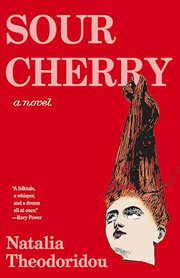
An unnamed stage actress sits in her apartment, telling her young son a fairy story. Urged on by the ghosts of blood-drenched women that only she can see, she speaks of a boy born in a stately home. A curious, perpetually hungry child with sharp nails and pointed teeth, the boy is abandoned by his spectral mother and soon-dead father, and doted on by his wet nurse, Agnes. He seems to bring a curse upon the village—the crops suffer blight year upon year, walls crumble, a young girl’s skin peels from her bones. When Eunice, a villager who played with the boy as a child, moves into the manor as his lover, the furious townspeople storm the gates with pitchforks, and the young couple flees. A shotgun wedding in a roadside chapel makes Eunice the first of his many abused and blighted wives, and the only one to bear him a son of his own. Young Tristan grows up determined to take revenge on his father—and the narrator’s son listens with bated breath. Theodoridou interweaves teller and tale to dizzying effect, leaving the reader to relish in some satisfying uncertainties. The narrator’s own career staging shows about violent men adds a delicious metatextual twist. “Easier to tell you of a man who was a myth, a natural disaster, a fairy-tale thing,” the narrator concedes to her son, “than to say your father is a wife-beater, a rapist, a murderer.” Unfortunately, the book’s length outstrips its conceit—a dense, dark gem of a story becomes frustratingly repetitive. The carousel of murdered wives, rotting fruit, and blood-soaked gowns evokes the cyclical horrors of abuse, but the eventual predictability soon dulls the narrative’s edge.


